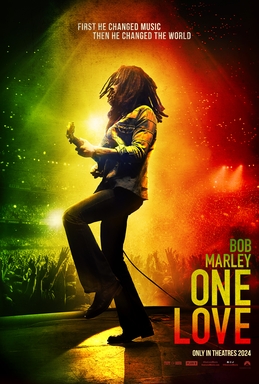
On Feb. 14, Paramount Pictures spread the love on Valentine’s day of Bob Marley’s music through “Bob Marley: One Love.” Filled with thick Jamaican accents and marijuana, the movie successfully explores the purpose of Marley’s voice.
“Bob Marley: One Love” begins at a point where Bob Marley (Kingsley-BenAdir) and the Wailers have already gained a significant political voice in Jamaica through their music. From 1976 to 1978, “Bob Marley: One Love” explores the significant political unrest in Jamaica and Marley’s attempts to spread peace. Citizens carrying machine guns, drive-by shootings in the neighborhood and living in a compound makes it clear the amount of danger Marley is constantly in. As a result of the political divisions in Jamaica and his influences, Marley is targeted in his home, but the shot misses and hits his wife instead, Rita Marley (Lashana Lynch), in the head.
To counter the violence created by the two political leaders of Jamaica, Marley and his band perform their “Smile Jamaica” peace concert in front of 80,000 fans, where he sees his assassinator again. Three months later, Marley and his band leave for London to work on their new album Exodus, featuring “Jamming,” “Three Little Birds” and “One Love.” During their time in London, Marley is exposed to The Clash, an influential English band to him.
“One Love” indicates many examples of Marley’s purpose in the music industry. When the final cover design for the new album featured just the word “Exodus,” Marley’s managers question why an image of Marley was not on it, making it clear they were in it to make money.
“We’re not in it for ego, in it cause of a cause,” Marley says.
Discussing the groups next tour locations, Marley wants to go back to Africa, but his managers claim there is no infrastructure. Marley then volunteers himself and the Wailers to build the infrastructure. His ideas are quickly disregarded and the group is sent on a European tour to Paris, the Netherlands, West Germany, Denmark and Sweden.
“Bob Marley: One Love” also highlights Marley’s focus on his music’s message and neglectful attitude towards the vast amount of money they were producing. At one moment, Marley points out that his manager is wearing a full outfit of designer clothing as opposed to the group wearing regular clothes.
Marley and the Wailers return home to Jamaica after their last concert in Sweden. “Three Little Birds” is playing as they get off the plane to hundreds of fans waiting for their arrival. When Marley arrives home and sees the bullet holes on the wall, he is reminded of the failed assassination attempt. The assassinator, however, comes to his home and apologizes, but Marley makes it clear the apology is not directed toward himself.
“Only you can redeem yourself,” Marley says.
“One Love” slowly begins to indicate the end of the movie as Marley is pictured singing one last song, “Redemption Songs” to the best audience: his children and wife around a campfire.
With Ziggy Marley – one of many Marley’s children – serving as one of the producers, his promise to authenticity is clear. Many scenes throughout “Bob Marley: One Love” are real moments of Marley’s life from outside footage and pictures. Additionally, Kingsley-BenAdir made sure to accurately portray Marley through his demeanor and especially his eclectic movements on stage.
Despite the feeling that the focus was constantly changing, “Bob Marley: One Love” credits Marley’s impact on the world to his music. Marley was more than a musician, and his lyrics are raw as he beautifully shared his message through music. He stood up for what he believed in and was not afraid to advocate for change in Jamaica and the world.


As • Feb 26, 2024 at 2:15 pm
The movie was good and I saw the documentary after, I like the documentary better because a lot of things were left out the movie that I think was important. I would go see it again
Sandra Davis • Feb 21, 2024 at 8:38 am
Bob Marley was such a Hero he was also a prophet thru his Music the world loved him even though he is not with us in the flesh.gone but not forgotten 💔 the Movie was Awesome also Ben & Rita & the other actors dida great job.
ONE LOVE FOREVER. THANK U ZIGGY MARLEY UR BLESSED.
Virginia Cruz • Feb 21, 2024 at 2:45 am
Beautifully done. I’ve seen it twice and plan to see it again. Kingsley did a great job. His accent was great.
Betty Lowery • Feb 20, 2024 at 12:37 pm
Loved the Movie. ♥️